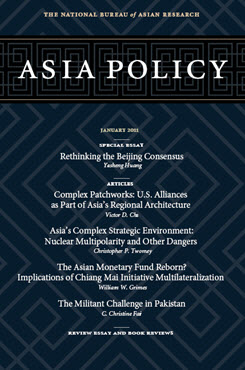Rethinking the Beijing Consensus
This essay examines whether or not there is a policy shift underway in China from free markets toward state capitalism.
EXECUTIVE SUMMARY
MAIN ARGUMENT
In the wake of the deepest recession in the West since 1929, many Western as well as Chinese analysts have been quick to pronounce the death of free markets and the triumph of the so-called Beijing Consensus. Not only has economic power gravitated toward the East, they argue, but the shift to state capitalism, Chinese-style, is burying market economics. Based on a careful analysis of data going beyond GDP performance, this essay shows that when measured by factors that directly track the living standards of the average Chinese person, China has performed the best when it pursued liberalizing, market-oriented economic reforms, as well as conducted modest political reform, and moved away from statist policies. In addition, using measures other than GDP, this essay shows that China’s performance metrics are in fact highly heterogeneous, which contrasts with the view implied by the Beijing Consensus that China is a homogenous country.
POLICY IMPLICATIONS
- For China, the essay shows the danger of embracing and accentuating economic statism. China needs to rethink its economic development strategy, which has so far suppressed the country’s vast potential of internal final consumption while rapidly ramping up production capacity. That combination is increasingly untenable. To rebalance, China must revert back to a more liberal package of economic and political reforms characteristic of the 1980s and move away from the statist model admired by many Western observers.
- For the United States, the essay underscores the importance of understanding the root cause of underconsumption in China—the falling growth rates of personal income since the early 1990s associated with a development strategy based on economic statism.
About Asia Policy
Asia Policy is a peer-reviewed scholarly journal presenting policy-relevant academic research on the Asia-Pacific that draws clear and concise conclusions useful to today’s policymakers. Asia Policy is published quarterly in January, April, July, and October and accepts submissions on a rolling basis. Learn more


